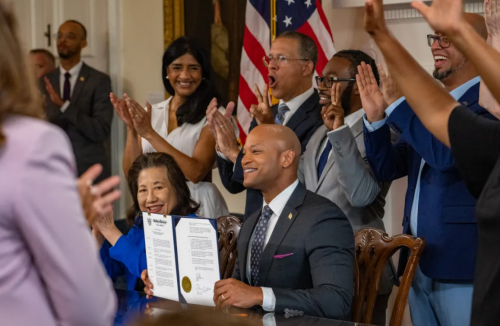"Gov. Wes Moore issued more than 175,000 pardons for misdemeanor cannabis possession and use convictions Monday morning — one of the largest state-issued pardons in U.S. history.
“We’ll be clear: This is just a step — this is not a conclusion,” Moore, a Democrat in his first term, said in an interview Monday morning. “You have to be able to right these wrongs in order for the right steps to be made.”
The pardons apply to over 150,000 misdemeanor convictions for cannabis possession and more than 18,000 misdemeanor convictions for use or possession with intent to use drug paraphernalia. At an Annapolis news conference Monday morning, Moore called this “the largest such action in our nation’s history.”
Marylanders voted by an overwhelming margin to approve recreational use cannabis for adults during the 2022 general election. Cannabis officially became legalized in the state July 1, 2023.
“You cannot talk about the benefits of legalization if you’re not willing to deal with the consequences of criminalization,” Moore said. “For people who are walking around with misdemeanor cannabis convictions, the weight of that action for them — in some cases, which are decades old — it still continues to hinder them: their ability to get a job, their ability to go to school, their ability to start a business, their ability to reintegrate with their family members.”
Monday’s pardons will not result in the release of any currently incarcerated person from prison. The cases receiving pardons for misdemeanor use or intent to use drug paraphernalia were not tied in with convictions on other charges.
Moore’s pardons will also not have an effect on voting rights.
In Maryland, people incarcerated for misdemeanors or who are being held pretrial maintain their right to vote. Those convicted of a felony offense are eligible to register to vote after serving a court-ordered prison sentence.
Officials from the Moore administration were unclear Monday morning exactly how many people will be affected, because some individuals will be pardoned for multiple convictions.
People with these convictions can see whether they received a pardon by visiting kiosks at any state courthouse or the Maryland Judiciary Case Search website, which will reflect those pardons in about two weeks. Those who are eligible but did not receive pardons can apply for them through the regular application process, which can be found on the Department of Public Safety and Correctional Services website.
At least a quarter of these pardons will apply to convictions in Baltimore City. Marylanders of color, particularly the Black community, have been disproportionately represented among these convictions.
Pardons, which can only be issued by the governor, still allow for the display of convictions on an individual’s record. To have a pardoned conviction removed from a record, people must file for expungement in the court where the case was concluded.
Moore said that the pardons were “a hard-fought victory,” not just for those who will receive them, “but for the soul of our state.”"
Learn more information about this historic decision in Baltimore Sun:
In historic move, Wes Moore issues pardons for over 175K misdemeanor cannabis convictions
Credit: Hannah Gaskill/Baltimore Sun



